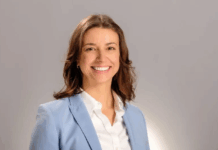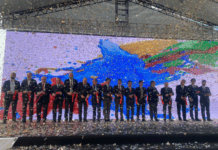
Siegwerk, a global provider of printing inks and coatings for packaging applications and labels, has partnered with German startup Wildplastic and the Hamburg University of Technology (TU-Hamburg) to increase the recyclability of plastic waste. One way to achieve this is by successfully deinking the collected waste before entering the recycling extrusion process. The partners conducted initial trials at the end of 2022, with successful results.
Of the billions of tons of plastic produced worldwide, only about 9% has been recycled, and about 12% ends up in landfills. The rest can end up leaking into the environment, polluting oceans and rivers, and breaking down into microplastics that are hazardous to human health. There is a clear and urgent need to improve recycling processes and to ensure that more packaging enters the recycling stream. Deinking packaging prior to regranulation helps to prevent the packaging inks from contaminating the materials to be recycled, and ensures that the packaging stays in the recycling stream.
The partners in the initiative recognize that it is only through cross-industry collaboration that progress can be made. Wildplastic is a German startup founded in 2019 aiming to clean the environment from plastic waste. In cooperation with communities of collectors, the start-up works globally to collect “wild” plastic from beaches, landfills, and illegal dumpsites. In spring 2019, Wildplastic started selling the first trash bag that is 100% made of recycled plastic. Currently, their focus is on sourcing low-density polyethylene (LDPE) such as bubble wrap or certain food packaging. LDPE cannot yet be widely recycled, so the market collection incentive for it is still limited.
Wildplastic wants to change this by creating a demand for this material and showcasing the potential of post-consumer LDPE recycling. After collection, the plastic is transported to a recycling partner who washes, melts, and processes it into granules. These recyclate granules are then sent to a production partner and used as a substitute for virgin LDPE material. This material is then used to create trash bags and mailbags. A broader scope of applications may be possible if the materials could be successfully deinked first.
In 2021, Wildplastic and the Institute of Circular Resource Engineering and Management (CREM) of TU-Hamburg started a cooperative research and development project, financed by the Investment and Development Bank of Hamburg (IFB) to study the feasibility of improving the quality of LDPE-recyclates from post-consumer sources. Evonik is supporting this project as a cooperative partner.
“We started to conduct research on deinking of post-consumer plastic waste with Wildplastic about one year ago. As a technical university, it is important to carry out meaningful research relevant to the real-world problem. From our project, we have learned that a successful circular economy only works by motivating all the stakeholders involved. Siegwerk as the producer of printing ink, can play an important role in this context since it brings the producer’s perspective to solve the problem in the beginning.” said Jinyang Guo from the Institute of Circular Resource Engineering and Management (CREM) from TU- Hamburg during a kick-off meeting between the partners in November 2022.
Siegwerk is supporting Wildplastic in this initiative by providing the deinking chemistry and knowledge to enable the creation of clean recyclates. In order for successful deinking to occur, a precise combination of the right ink chemistry, the right deinking detergent, and the right process need to be applied. Inks on packaging can often be a hindrance to recycling, as the inks degrade during the recycling process and can contaminate the recyclates, leading to unpleasant odors or unsightly colors. Even if the inks are not totally removed, the opportunities for recycling are increased exponentially.
“It is a pleasure to work with our partners from Wildplastic and from the University of Hamburg on this topic. We have a strong can-do attitude in common. The scientific perspective and the conscientiousness contributed by Jinyang helped us to maintain a fact-based and objective view. Not only in the design of experiments but also in the interpretation of results. Wildplastic has the ambition to benefit from deinking in their recycling activities in just a few months and brings in an industrial perspective,” said Ingo Fehr, Senior Project manager at Siegwerk.
“We have started this collaboration with Jinyang and the University about one year ago following our deep interest to find a solution for specific washing needs for highly challenging post-consumer plastic film materials in a small-scale batch operation. From day one we have worked together in a very open and solution-orientated way and with a shared passion. It´s all about getting the right people together, therefore we are extremely happy to share our results and to extend our collaboration with the team at Siegwerk,” said Wildplastic co-founder Dieter Gottschalk.









